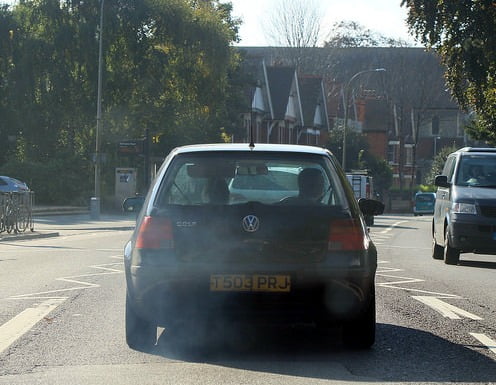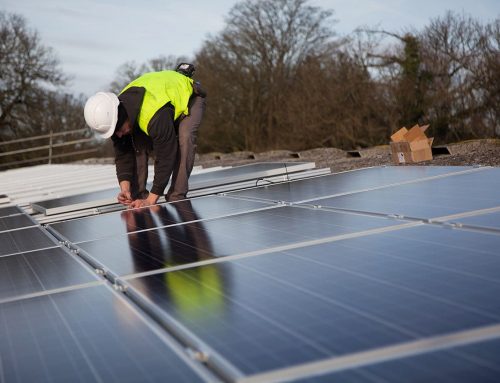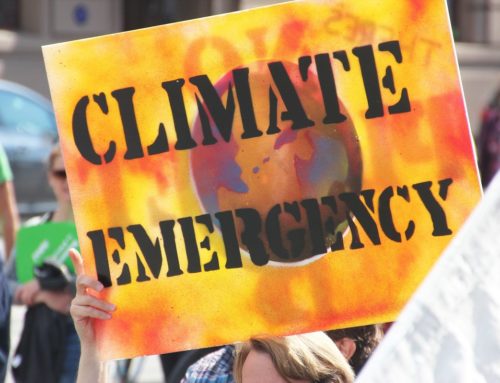by Dominic Hogg
8 minute read
If there is a silver lining around the breath-constricting cloud that hangs over Volkswagen (and, perhaps, other manufacturers of diesel vehicles as well), it’s that the publicity raises awareness of the damages caused by air pollution. While a cadre of politicians and journalists strive to maintain the impression that there’s a debate to be had on the science of climate change, there’s far less dissent from the view that air pollution brings a trail of misery, and even death, in its wake.
It’s a point that the advocates for action on climate change would do well to heed. It’s long been recognised that there are co-benefits associated with addressing climate change. But how large might these co-benefits actually be?
Choose your poison
A 2010 Defra study found that, while significant, the air quality damages from road transport was outweighed by the climate change damages, as shown in the table below.
|
Petrol car |
Diesel car |
Petrol Hybrid |
|
| Climate change | £166 | £146 | £98 |
| Air quality | £1 | £21 | £1 |
| Total | £167 | £167 | £99 |
These figures were based on 2010 standards for cars, and the report suggested that the Euro 5 standards, which applied to all new cars from January 2011, would bring particulates emissions for diesel engines into line with those for petrol cars.
Two things seem worth commenting on:
- For the diesel car, the air pollution damages are reasonably significant relative to those from climate change. The air pollution damages were valued using relatively low damage costs sanctioned by the Interdepartmental Group on Costs and Benefits (IGCB) at the time. The IGCB has since radically increased the values for NOx in particular. We might now also suspect that the NOx emissions themselves could have been understated (the method used for the calculation is not clear). The combined effect would be to significantly raise the air pollution impact from diesel.
- As it stands, the Defra study implies that the overall effect of switching from a petrol vehicle to a diesel one is nil; we just swap some climate change damages for some air pollution damages (which would you prefer?).

We should be glad to see the back of air pollution from diesel engines. Photo by Adrian Midgley (CC BY-NC-ND 2.0) via Flickr.
With so many vehicles now powered by diesel, the air pollution co-benefits of addressing climate change emissions from transport would appear to be considerable.
Power corrupts
With all of the controls on air pollution from stationary sources, such as power stations and industry, you might think that this is small beer compared with transport emissions. It isn’t. The table below show data from Defra on some key air pollutants. I’ve highlighted three sectors and the UK total emissions, all in thousands of tonnes.
|
SO2 |
NOx |
PM10 |
PM2.5 |
|
| Energy industries (Combustion in power plants & Energy Production) | 205.8 | 351.2 | 8.5 | 5.5 |
| Manufacturing Industries and Construction | 109.3 | 148.3 | 9.1 | 8.6 |
| Road Transport | 0.8 | 323.0 | 21.6 | 15.0 |
| Total | 393.2 | 1019.7 | 123.5 | 81.5 |
Industry and energy generation account for far more emissions of sulphur dioxide than transport (a benefit of the switch to low sulphur fuels). On NOx, energy outdoes transport, though it may now be that the transport figures need to be revised upwards. On particulates, transport is a larger contributor.
What we need to understand, though, is the monetised impacts of these emissions. For a crude estimate, I’ve taken the figures for the three sectors and multiplied the quantity emitted by the IGCB’s central damage costs figures.
|
£ millions |
% of total damages |
|
| Energy industries (Combustion in power plants & Energy Production) | 5,272 | 29% |
| Manufacturing Industries and Construction | 2,438 | 14% |
| Road Transport | 9,414 | 53% |
Together, these three sectors account for around £17 billion of damages a year, with the total contribution from industry and the energy sector being only marginally lower in the round, than emissions from transport.
Balance of power
It’s reasonable to think that the damages from energy and manufacturing come from the use of fossil fuels, though burning biomass, biogas and waste will also contribute. In fact, we can examine the relative greenhouse gas and air pollution damages associated with electricity generation from coal and gas. Combining figures for the emissions from coal fired power stations and natural gas with IGCB damage costs gives the following results:
| Source of Electricity
|
Gas |
Coal |
| Ratio of Air Pollution Damages to Climate Change Damages (CO2 @ £20/t) | 116% | 210% |
| Ratio of Air Pollution Damages to Climate Change Damages (CO2 @ £60/t) | 39% | 70% |
I’ve shown ratios based on two different values for GHG damages: £20/t CO2 and 60/t CO2. At values which are currently used widely, then the air pollution impacts dominate. Even if we place a higher value on CO2, they remain significant.
It’s clear, then, that if we phase out coal and then gas, we could reap considerable benefits in respect of air pollution as well as climate change – although these benefits will be reduced if we switch into biomass, biogas and waste. As for fracking, whatever your perspective on climate change the argument around the likely air pollution consequences of continued reliance on gas is pretty potent.
I’m not arguing that we’re ‘focussing too much’ on climate change, least of all now: rather, we’re focussing too little on both air pollution and climate change, and we’ll all be much better off if they are tackled comprehensively and simultaneously.
If we are going to place a price on carbon, why would we not do the same with other air pollutants? If we ignore air pollution, efforts on climate change (e.g. relying more on burning biomass) could worsen the quality of the air we breathe. Given the scale of the investment required, we need to pick win-win changes, not win-lose ones.
Doing his duty?
Given what we now know, the incentives that encouraged the switch from petrol to diesel vehicles have almost certainly induced a switch whose net effect has been negative, despite the greater fuel efficiency of diesel. The two main culprits here have been fuel duty and vehicle excise duty (VED).
When the Chancellor announced changes to VED in his July Budget this year, I wrote a blog about his take on (or, rather, his failure to increase the take of) environmental taxes. I argued that:
a more interesting restructuring of VED would have included an element related to the emissions performance of vehicles. This might have led to a reversing of the trend towards purchase of diesel vehicles, the increasing demand for which has been propelled by VED, but worsened the problems of urban air pollution related to transport.
Studies I’ve worked on for the European Commission identify that several countries in the EU already structure their registration taxes (the ones people pay when they buy their car, or register it in a country for the first time) and / or circulation taxes (the ones people pay on an annual basis after purchasing the car) according to the air emissions from vehicles. There’s no reason why the UK couldn’t do something similar to disincentivise consumers from picking more polluting vehicles, though that needs to be based on real performance rather than the fabricated data that has recently been highlighted.
As for fuel duty, the Chancellor’s populist line is to allow it to be steadily eroded by inflation. The duty per litre on petrol and diesel remains the same, although the carbon content of a litre of diesel is more than 10% higher.
Ruddy DECC
Part of the problem here may be departmental boundaries – pollution sits with Defra, energy generation and climate change are with DECC, while the Department for Transport has its own separate priorities – perhaps contributing to our slow progress towards decarbonising transport. While Amber Rudd, Secretary of State for Energy and Climate Change, may now be challenging the transport secretary to do more to help the UK meet renewable energy targets, her position is perhaps undermined by her enthusiasm for new road schemes in her own constituency.
On stationary sources, which are a much more straightforward target for control, I hope I’ve managed to persuade readers that there is a compelling case for some form of pricing. £5 billion of mortality and morbidity-related damages each year, from the energy sector alone, tells us something: companies are getting away scot free with behaviour that contributes to thousands of premature deaths. There couldn’t be a more obvious case of where a tax on emissions is justified, but most EU countries are extraordinarily tentative where this is concerned. For the energy sector in particular, given both the air pollution emitted and the climate change consideration, there is an urgent need to develop a transition pathway that helps re-train and re-skill those currently employed in the sector: revenues could be used to support the transition away from industries whose demise we badly need to hasten, not delay.
Our fossil fuel addiction has given rise to major air pollution issues, as well as the global problem of climate change. The two must be addressed hand in hand: if we focus on climate alone, we will generate problems of air pollution (and others), just like the switch from petrol cars to diesel ones; and if we focus on air pollution alone, we’ll end up abating pollution, but continuing to emit greenhouse gases. We need an even-handed approach, but it should be obvious to all concerned that both hands need to be more fully engaged. At the moment, it feels increasingly like we’re going hands free.






Leave A Comment